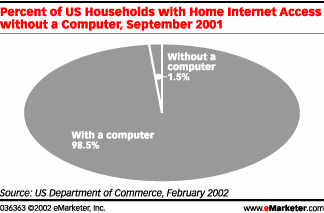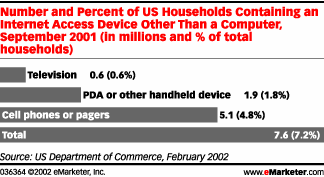 |
|
|
|
Much has been written about the idea that growing broadband adoption and digital technology would lead to the convergence of PCs and TVs in a single device. Many commentators have actually predicted the demise of the PC, citing falling PC sales, growing numbers of internet appliances and handheld devices, and the emerging possibilities of interactive television. Larry Ellison, CEO of Oracle, has long held the view that desktop PCs would diminish in importance. He recently proclaimed, "The only things left on PCs are [Microsoft] Office and games." Steve Jobs, from Apple, however, holds a different view: "We don't think the PC is dying at all -- just evolving" If the PC is dead or dying as a result of the growing popularity of other internet-enabled and interactive devices, it certainly hasn't happened yet in the US. The US Department of Commerce's recently released the report A Nation Online: How Americans are Expanding Their Use of the Internet, which indicated that only 1.5% of the 106 million households in the US had home internet access without a computer in September 2001.
The Department of Commerce further added that there were only 7.6 million households in the US in September 2001 that contained an internet access device other than a computer. There were 5.1 million households containing an internet-enabled cellphone, 1.9 million with internet-enabled PDAs or handhelds and only 600,000 that had an internet-enabled TV.
The US has had a long love affair with the PC. According to the International Telecommunication Union (ITU), the US has more PCs per 100 inhabitants (nearly 60) than any other country. Europe, for example, has only 17 computers per 100 inhabitants as of January 2002. The high PC penetration in the US is one significant reason why few US households have felt the need to look to alternative devices to get their internet access. By the same token, it may have also prevented, or at least delayed, US companies from investing in alternative internet devices. In contrast, the United Kingdom and Japan, who have 34 and 32 PCs per 100 inhabitants respectively, according to the ITU, are two countries where interactive devices other than the PC are very popular. In Japan, over one-half of Japan's 70 million cellphone subscribers have net access through their phones, according to the Japanese Ministry of Post and Telecommunications. The UK also has a very high mobile phone penetration rate, and the population has particularly embraced SMS (short messaging service) and interactive TV services. While the PC is not going away in a hurry in the US (or anywhere else, for that matter), the emerging trends in technology and interactive devices will mean that services, applications and internet usage will no longer be tethered to particular devices. The PC will need to continue to evolve to maintain its relevance in the converging future. Ben Macklin is a Senior Analyst for eMarketer and the author of the Telecommunications Spending Report, the North American Wireless Report and The Broadband Report. E-mail him at with comments, suggestions and questions.
|
|||||


